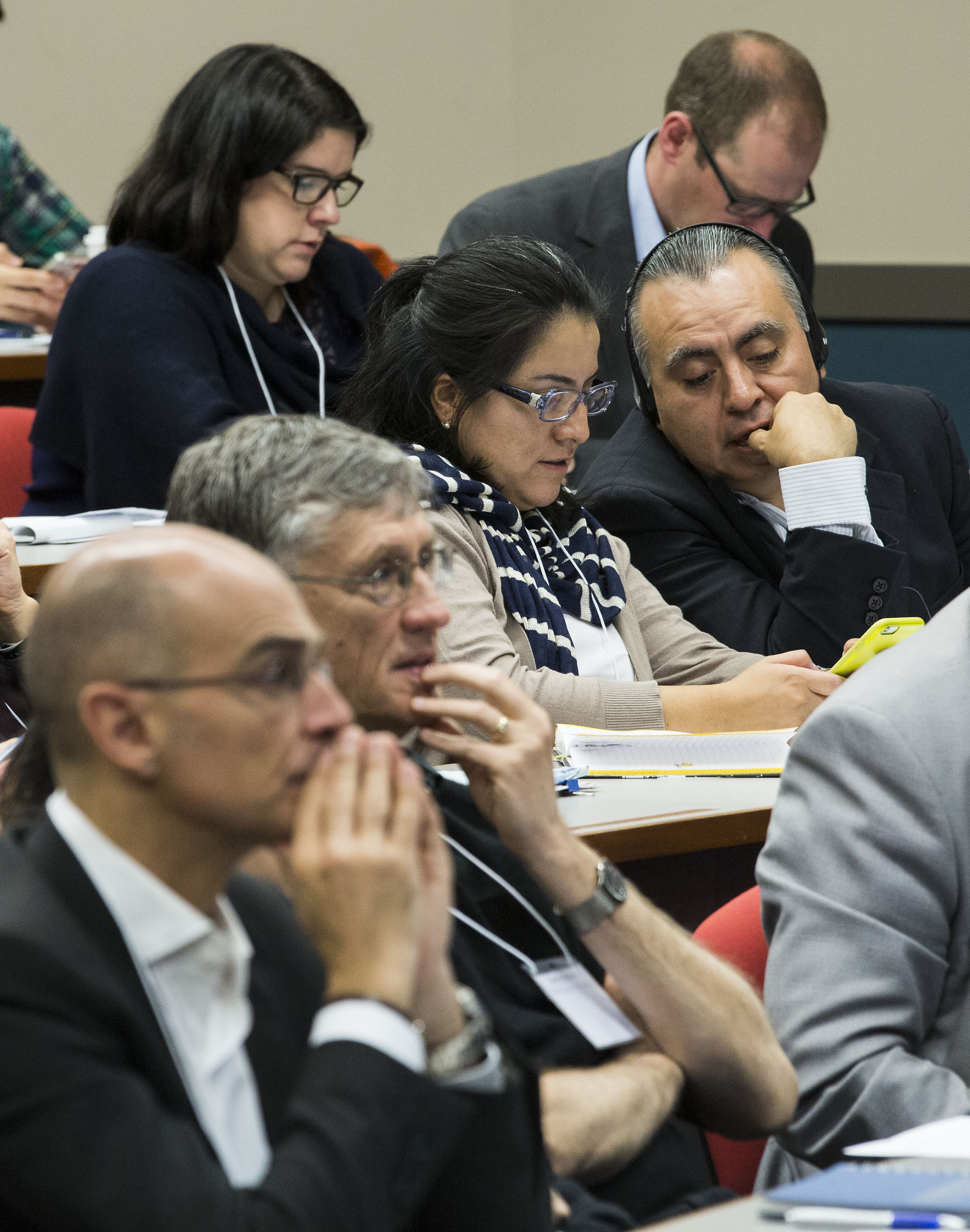 Experts in homelessness listen during an international conference hosted by the Institute of Global Homelessness at DePaul University. Efforts to collaborate on ending homelessness have sometimes stalled because of a lack of shared definitions, but a new framework from the institute aims to help advocates measure and understand the issue across borders. (Photo by Jamie Moncrief)
Experts in homelessness listen during an international conference hosted by the Institute of Global Homelessness at DePaul University. Efforts to collaborate on ending homelessness have sometimes stalled because of a lack of shared definitions, but a new framework from the institute aims to help advocates measure and understand the issue across borders. (Photo by Jamie Moncrief)CHICAGO — Ahead of World Homeless Day Oct. 10, researchers have released a new framework to help unite those addressing homelessness worldwide. The Institute of Global Homelessness at DePaul University developed categories to help policymakers, practitioners and researchers more accurately identify and measure this vulnerable population, using definitions that work across international borders.
The newly released document, “A Global Framework for Understanding and Measuring Homelessness,” offers clear language to describe and assess homelessness and to define the circumstances people face when they lack minimally adequate housing.
Clear definitions matter, said Kat Johnson, director of the institute. Without shared language, one country might count every possible form of homelessness, while another might only count those sleeping on the street. “This makes comparisons difficult,” said Johnson. “To craft appropriate policy initiatives and targeted interventions, we must accurately answer the question, ‘who is homeless?’”
Johnson explained that before the framework, experts wasted valuable time at international conferences debating what homelessness means in their own countries, rather than developing solutions. “With clear, agreed-upon definitions, we can now make comparisons across borders, evaluate homelessness more accurately, look for international trends and take action to end homelessness,” said Johnson.
The framework groups people experiencing homelessness into three broad categories:
- People without accommodation, including those sleeping in the streets, in their cars or in public spaces.
- People living in temporary or crisis accommodation, including people staying in shelters or camps.
- People living in severely inadequate and insecure accommodation, including those who are staying with family or friends.
Thought leaders in nearly 30 countries across six continents helped develop, test and improve the framework. The lead authors are Volker Busch-Geertsema, senior research fellow, Association for Innovative Social Research and Social Planning, Bremen, Germany; Dennis Culhane, professor of social policy, University of Pennsylvania; and Suzanne Fitzpatrick, professor of housing and social policy, Heriot-Watt University, U.K.
“We were asked to provide a global estimate of homelessness, but that is not yet possible,” said Busch-Geertsema. “Shared language will help the worldwide initiative to address the problem and to gain more accurate numbers. Numbers drive investment.”
At the same time, it is not necessary that all countries agree on or accept all of these categories or their subsets, write the researchers, who wrote the framework to be intentionally broad and inclusive.
“A common framework will allow stakeholders from different contexts to engage in meaningful dialogue,” said Culhane. “This also lays the foundation for measuring homelessness, which should help to generate momentum for action in parts of the world where greater progress is needed to tackle homelessness.”
”We have big ambitions at the Institute of Global Homelessness,” said Fitzpatrick. “We want to do something about homelessness across the world, and therefore we need a set of understandings and concepts that make sense across the world.”
Already, the framework has helped the institute focus its work on those experiencing street homelessness or who are in certain forms of temporary crisis shelters. “We believe we can make the greatest impact working in these areas. These are the populations of homeless people who exist in every country but who all too often receive little public attention,” said Johnson. “We want to make sure that they are not overlooked.”
The Institute of Global Homelessness is a collaboration led by DePaul University and Depaul International. The institute serves as a central hub where practitioners, policymakers and researchers can find the tools they need to end homelessness on a global scale. For more information about the Institute and to access the study, visit http://bit.ly/IGHFrame.
###
Sources:
Kat Johnson
kjohnson@ighomelessness.org
312-362-8044
Suzanne Fitzpatrick
(Contact Caroline Dempster)
C.M.L.Dempster@hw.ac.uk
Volker Busch-Geertsema
vbg@giss-ev.de
+494213347082
Dennis Culhane
Culhane@sp2.upenn.edu
Media Contact:
Kristin Claes Mathews
kmathew5@depaul.edu
312-241-9856